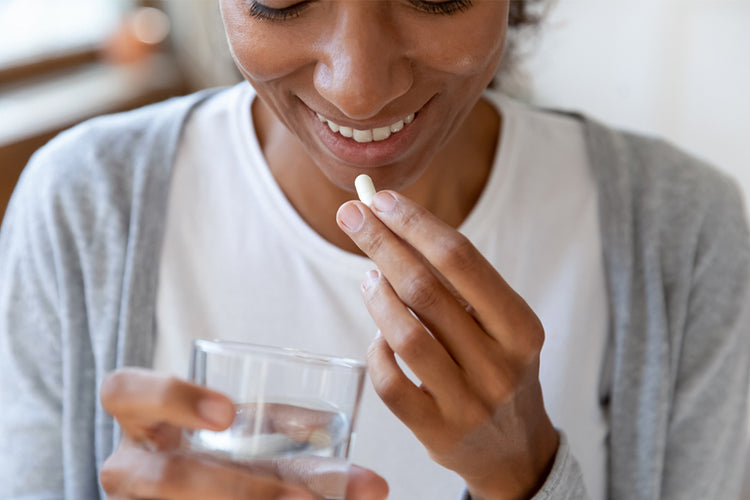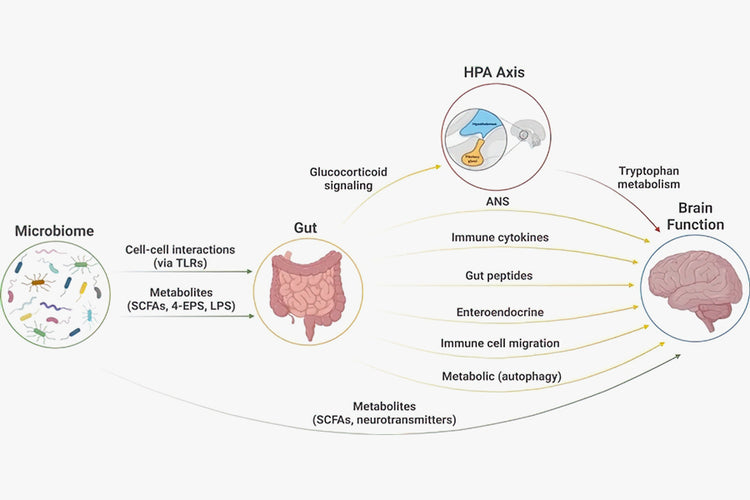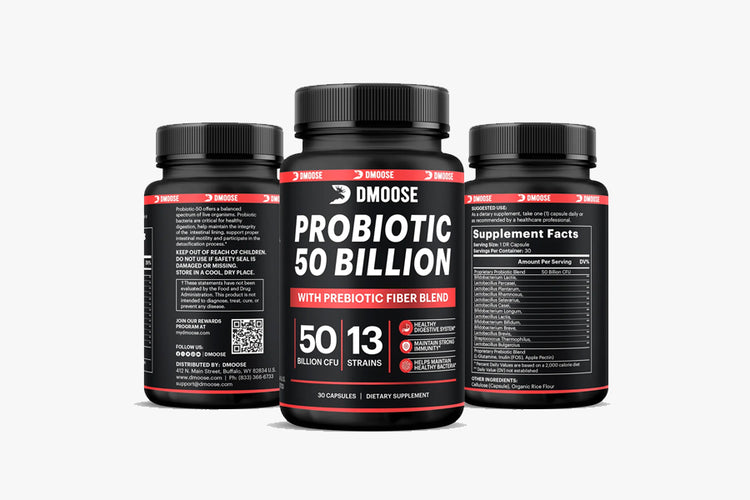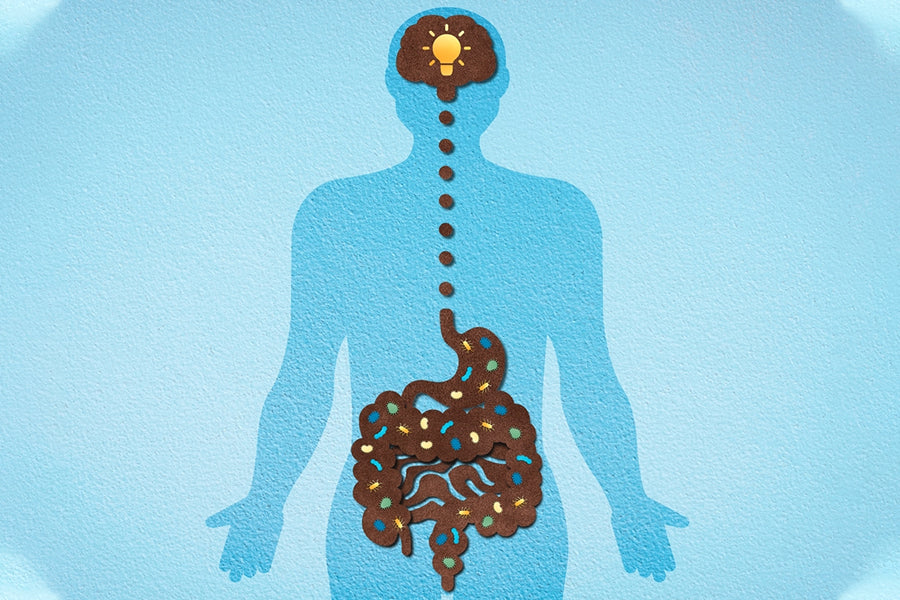Dear reader! Welcome to the fascinating world of the gut-brain connection. Yep, these two seemingly unrelated body parts are more connected than you might think.
Let's start with a fun fact: There are over 100 trillion bacteria in your gut. That's ten times the number of human cells in your body! These microscopic critters, known as probiotics, are not just hitching a ride; they're hard at work ensuring your gut is in its best shape.
But their job description goes beyond digestion. They're also major players in mental well-being. Intrigued yet? Buckle up because we're just getting started!
Imagine having a super-efficient team of mini-counselors living inside your belly, managing your mood swings, and keeping stress at bay. That's pretty much what these probiotics do!
Research has shown that these tiny gut inhabitants can influence our mental health, playing a crucial role in conditions like anxiety, depression, and even memory loss.
Think about it this way: when you're feeling low, you might reach for comfort food, right? And when you're stressed, your stomach might start acting up. That's your gut and brain communicating!
By taking care of your gut (with the help of our friendly probiotics), you're also looking after your mental well-being. So, whether you're a gut health guru, a mental well-being warrior, or just someone who loves learning about the wonders of the human body, you're in the right place.
Stick around as we deeply explore the gut-brain connection and uncover how probiotics could be your secret weapon for better mental health.
We promise it's going to be a wild, informative ride!
Related Article: 15 Advantages of Probiotics That Will Change Your Life Forever
The Gut-Brain Connection
The gut-brain connection, also known as the gut-brain axis, is a complex communication network that links your enteric nervous system-essentially your gut's nervous system-to your central nervous system, which comprises your brain and spinal cord.
This connection is not one-way; it's bidirectional, meaning your brain sends messages to your gut, and your gut sends messages back.
What serves as the bridge between these two systems? The connection is established through the hypothalamic-pituitary-adrenal (HPA) axis, the autonomic nervous system, and nerves situated within the gastrointestinal tract.
This intricate link empowers the brain to influence various activities in the intestine, including the actions of immune effector cells, which are pivotal components in our immune response.
In a similar vein, the gut exerts an influence on the brain by controlling cognition, mental health, and mood. It does this by releasing neurotransmitters and hormones that play crucial roles in mood regulation.
The immune system also plays a part in the gut-brain connection. Immune cells in the gut communicate with the brain, especially under conditions of stress or infection. But perhaps the most fascinating component of the gut-brain connection is the role of the gut microbiota-the trillions of bacteria and other microbes living in our digestive tract.
These microbes produce various chemicals, including short-chain fatty acids and neurotransmitters, which can affect brain function. They also interact with the immune system and can influence its response.
For example, it's now widely accepted that conditions such as depression and anxiety are connected to gastrointestinal tract disturbances. Also, gastrointestinal diseases like irritable bowel disease and irritable bowel syndrome frequently carry psychological burdens associated with gut microbiome disruptions.
Given these facts, it's not startling to learn that a person's diet can influence the gut microbiome, subsequently affecting cognitive function.
Are Probiotics Really Capable of Improving Mental Health?

Probiotics are living microorganisms designed to enhance individuals' overall health. They can be found in various sources, including yogurt, dietary supplements, and various fermented foods.
While the term 'microorganisms' might immediately make you think of harmful bacteria or 'germs,' the reality is that many of these tiny creatures play a beneficial role in our bodies. For instance, certain types of bacteria assist us in digesting food, generate essential vitamins like Vitamin K and B, and wage war against cells that cause diseases.
Interestingly, many of the bacteria used in probiotics are identical to or similar to those that naturally inhabit our intestines. The most commonly recognized probiotics belong to the Lactobacillus and Bifidobacterium families.
Let's delve into a few key roles that probiotics play in our bodies:
- They bolster the body's immune response, making it more capable of fighting off infections and diseases.
- They produce substances such as neurotransmitters and vitamins that confer various health benefits.
- After disturbances-like a course of antibiotics-that can throw the gut's microbiome out of balance, probiotics can help restore it to its healthy state.
Related Article: 6 Benefits of Probiotics for Women and How to Pick the Best One
Evidence Showing How Probiotics Can Help Ease Depression and Anxiety

Depression and anxiety can be debilitating conditions that significantly impact one's quality of life. While many treatments are available, some people are turning to a new approach to help ease their symptoms: probiotics.
This fascinating concept has many people discussing the potential benefits of probiotics for mental health. Could a simple addition to our diet be the missing link in treating these conditions? It's certainly worth exploring with evidence, so let's do it!
Probiotics Upgrade Mental Functions

There's a detailed review of studies in Current Pharmaceutical Biotechnology that shows how probiotics-those good-for-you bacteria-can actually boost brain functions in people dealing with mental health issues.
Cool, right? They found that people struggling with tough stuff like depression, Alzheimer's, anxiety, and autism spectrum disorders saw positive changes thanks to these little helpers. But hold on, it's not all set in stone. While these results are promising, we still need more research to ensure these friendly microorganisms are safe and truly effective.
Probiotics Manage Depression
A groundbreaking clinical trial published in Translational Psychiatry further proves how probiotics can help manage depression symptoms. This study was spearheaded by Anna-Chiara Schaub, a renowned professor, and researcher at the University of Basel's Department of Psychiatry in Switzerland.
She and her team set out to see if short-term, high-dose probiotics supplementation could lessen depression symptoms by altering the gut microbiota and neural connections in patients diagnosed with depression.
The researchers brought together a group of patients currently undergoing depressive episodes for their study. The participants were split into two groups: the probiotic group (21 people) and the placebo group (26 people).
For 31 days, the probiotic group received a multi-strain probiotic supplement along with their usual treatment. The placebo group, on the other hand, received a placebo alongside their standard treatment.
Methods
In this study, researchers used the Hamilton Depression Rating Scale (HAM-D) at the start, right after the 31-day treatment, and then again four weeks later. This scale was used to track any changes in the participants' depression scores from the beginning through the end of the intervention and into the follow-up period.
And guess what? The results were pretty impressive. The folks in the probiotic group saw their HAM-D scores drop significantly over time compared to the placebo group.
What's even cooler is that these positive effects stuck around. During the follow-up, the probiotic group's HAM-D scores were still significantly lower than when they started. About 80% of the patients who received probiotics saw these changes during follow-up, compared to just 48% in the placebo group.
Even though both groups were on their usual depression medications, the researchers found that adding probiotics offered extra benefits in reducing depression.
Sure, the study group wasn't huge, but the findings were still pretty significant. They add weight to the idea that combining probiotics with standard treatments might offer better results than just sticking with the usual treatment.
Results
Here's a fascinating twist: this study found that probiotics not only improved gut health but also helped ease depression symptoms. The probiotic supplement helped maintain a diverse community of microbes in the gut and even boosted the overall composition.
In particular, the supplement bumped up the population of Lactobacillus-a type of bacteria that's super important for a healthy gut. But the folks who just got the usual treatment and a placebo didn't see the same kind of results.
The researchers didn't stop there, though. They also used brain imaging to see if probiotics could improve the volume of grey matter in the brain. And guess what? The group taking probiotics did show a significant increase compared to the placebo group.
But here's the catch: to get these benefits, you've got to stick with the probiotic regimen. The researchers noted that the positive effects were most noticeable in those who strictly followed the supplementation program. The benefits were even more pronounced after eight weeks.
As the researchers put it, "notably, in our study, probiotic effects were only significant in a subsample with high compliance and accentuated in the follow-up after eight weeks… the importance of compliance during probiotic supplementation should be highlighted and is as important as in general antidepressant therapy."
The Role of DMoose Probiotic Supplementation

Well, as you've seen how important probiotics are and what they do for the gut and brain, let's talk about one supplement that caters to both. The DMoose Probiotic 50 Billion CFU!
It is more than just a supplement; it's a holistic approach to wellness designed to enhance gut health and mental well-being. This potent blend is packed with 13 probiotic strains, including lactobacillus and bifidobacterium, each a tiny warrior in the fight for a balanced and diverse gut microbiome.
But the magic doesn't stop there. DMoose steps up the game by incorporating a prebiotic fiber blend into its formula. You can think of prebiotics as the secret weapon that fuels the good bacteria in your gut, ensuring they thrive and outnumber the bad ones.
What's more, this supplement has a unique stomach acid protection and delivery system. This means these beneficial probiotics aren't lost in the harsh environment of your stomach-they're safely delivered to your gut, where they can work their magic.
By fostering a healthy gut flora balance, it aids in efficient digestion and nutrient absorption, potentially easing symptoms of conditions like ulcers and inflammatory bowel disease, ultimately keeping your nerves in control.
But it doesn't just stop at your gut. It is one of the best probiotics for mental health that boosts your immune system, acting as a guardian against illness. After all, a large part of your immune cells live in your gut!
With DMoose Probiotic 50 Billion CFU, you may also enjoy the benefit of disease prevention and improved cholesterol levels. Plus, it supports a positive mood-because a happy gut often leads to a happier mind. And let's not forget energy levels. By ensuring that nutrients are properly digested and absorbed, it can help reduce fatigue, leaving you feeling revitalized and ready to seize the day.
To sum it up, DMoose Probiotic Supplement is a key player in your journey towards overall health and well-being. By naturally and effectively supporting your gut, it helps boost almost every aspect of your health. So why not give your gut-and yourself-the best care possible with DMoose?
Additional Note: DMoose has introduced a new supplement, much stronger and healthier probiotics, and immunity-strengthening formula, Immune Pro Support. It is packed with 60 billion CFU probiotics, which means 2X better gut-brain strength!
FAQs
1. Do probiotics boost serotonin?
Probiotics in our gut might help improve symptoms of Major Depressive Disorder (MDD) by ramping up the production of free tryptophan. And why is that important?
Tryptophan is a key player in making serotonin, often called our "feel-good" hormone, because it helps regulate mood. So, more tryptophan could mean more serotonin, which might lead to better mental health.
2. How long do probiotics take to work for depression?
Probiotics take around 8 weeks for effective results for depression.
3. What is the strongest brain supplement?
Besides probiotics, multiple supplements work well for brain health, such as omega-3 fish oil, multivitamins, and creatine powder.
4. Do probiotics take time to adjust?
Like with any change to your diet or routine, your body might need time to adjust when you start taking probiotics. You might experience some gas or bloating at first, but don't worry—these side effects are commonly reported and usually disappear within a couple of weeks.
On the other hand, some people may not notice any side effects. Everyone's body is different, so it's all about giving your body the time it needs to get used to the new addition.
5. Does the time of day matter for probiotics?
Taking them about 30 minutes before you eat might boost their effectiveness, allowing them to settle in your stomach before it gets busy digesting food. And if you're wondering which meal is the best to pair with your probiotic supplement, breakfast might be the winner.
Starting your day with probiotics can set your gut up for success immediately! But remember, everyone's body is unique, so find a routine that works best for you.
Summing It Up!
Mental health is not just about our minds—it's also intricately connected to our gut. And this is where probiotics come into play. Probiotics, these tiny but mighty warriors of well-being, have shown promising potential in enhancing our mental health. They're not just beneficial for our digestive systems, but they also play a crucial role in managing stress, mitigating symptoms of depression, and even possibly improving conditions for individuals on the autism spectrum.
The beauty of probiotics lies in their simplicity and affordability. They're not a high-cost, complex treatment but a straightforward, cost-effective addition to your daily routine. A small change with potentially significant outcomes.
And that's why we're excited to recommend DMoose Probiotic Supplementation. This powerful blend is packed with multiple probiotic strains designed to give your gut and brain the support they need. It's time to take control of your health and invest in your well-being.
So why wait? Start your journey to a happier, healthier life today with DMoose. Give your gut the care it deserves, and your mind will thank you. Your journey towards better mental health could be just a click away!
Reading List
Article Sources
- Ansari, Fereshteh, et al. "The Effects of Probiotics and Prebiotics on Mental Disorders: A Review on Depression, Anxiety, Alzheimer, and Autism Spectrum Disorders." Current Pharmaceutical Biotechnology, vol. 21, no. 7, 2020, pp. 555-65. PubMed, https://doi.org/10.2174/1389201021666200107113812.
- Carabotti, Marilia, et al. "The Gut-Brain Axis: Interactions between Enteric Microbiota, Central and Enteric Nervous Systems." Annals of Gastroenterology : Quarterly Publication of the Hellenic Society of Gastroenterology, vol. 28, no. 2, 2015, pp. 203-09. PubMed Central, https://www.ncbi.nlm.nih.gov/pmc/articles/PMC4367209/.
- Gars, Aviva, et al. "First Encounters: Effects of the Microbiota on Neonatal Brain Development." Frontiers in Cellular Neuroscience, vol. 15, 2021. Frontiers, https://www.frontiersin.org/articles/10.3389/fncel.2021.682505.
- Guinane, Caitriona M., and Paul D. Cotter. "Role of the Gut Microbiota in Health and Chronic Gastrointestinal Disease: Understanding a Hidden Metabolic Organ." Therapeutic Advances in Gastroenterology, vol. 6, no. 4, July 2013, pp. 295-308. PubMed Central, https://doi.org/10.1177/1756283X13482996.
- Liu, Yen-Wenn, et al. "Effects of Lactobacillus Plantarum PS128 on Children with Autism Spectrum Disorder in Taiwan: A Randomized, Double-Blind, Placebo-Controlled Trial." Nutrients, vol. 11, no. 4, Apr. 2019, p. 820. www.mdpi.com, https://doi.org/10.3390/nu11040820.
- Mensi, Martina Maria, et al. "Lactobacillus Plantarum PS128 and Other Probiotics in Children and Adolescents with Autism Spectrum Disorder: A Real-World Experience." Nutrients, vol. 13, no. 6, June 2021, p. 2036. www.mdpi.com, https://doi.org/10.3390/nu13062036.
- Schaub, Anna-Chiara, et al. "Clinical, Gut Microbial and Neural Effects of a Probiotic Add-on Therapy in Depressed Patients: A Randomized Controlled Trial." Translational Psychiatry, vol. 12, no. 1, June 2022, pp. 1-10. www.nature.com, https://doi.org/10.1038/s41398-022-01977-z.














